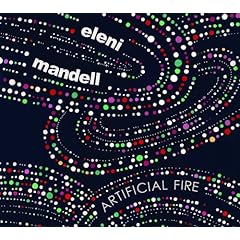« older | Main Largehearted Boy Page | newer »
February 17, 2009
Note Books - Eleni Mandell
The Note Books series features musicians discussing their literary side. Past contributors have included John Darnielle, John Vanderslice, and others.
Eleni Mandell's new album, Artificial Fire, is out today, and showcases the singer-songwriter's intriguingly dark lyricism and diverse musical styles.
"Artificial Fire" [mp3] from Artificial Fire
In her own words, here is the Note Books entry from Eleni Mandell:
My favorite book is Shadows on the Hudson by Isaac Bashevis Singer.
My affair with an Alaskan fisherman was coming to an end. Although he was also an artist and very smart, he'll always be known as The Fisherman to me. I remember crying when the relationship was falling apart and he very sincerely said "you think I like being this way? It's like driving a broken-down truck all the time." That was the most insightful thing he ever said about himself and his shortcomings (showing up three hours late; acting inappropriately etc.). When I first read Singer's novel, it felt almost like a coded communication between myself and The Fisherman, a way to understand him and what had happened between us.
The book follows a group of Jewish immigrants in 1950s New York and focuses on Grein, the anti-hero. He is tortured by his lack of faith in God, humanity and his own behavior. Similarly, my fisherman was Jewish and was tortured by his inability to function as a part of society. He had trouble with basic life skills. When he first wrote down my phone number he put it in his hat and then put the hat on his head. He promptly lost my number so would just show up periodically and jump in front of my living room window. Like Grein, he also had a way with women. Grein lied to everybody; his wife, his lovers, his friends and his children.
The title alone gives me a feeling of sadness, highlighting the difficulties of life but pointing to small wonders, too. I do love what I call "Jew Books" (another favorite being The Yiddish Policemen's Union by Michael Chabon). I am also Jewish, though not religious, and I relate to Singer's twisted tales of my complicated group. Many of his characters have also assimilated and have left religion behind but still have a nagging connection to their people.
Grein has become a secular Jew, turning his back on his Hassidic upbringing. He is married with grown children but he barely relates to them or to his wife. The book opens with a discussion between intellectual, Jewish friends who escaped the Old World and love to talk about whether God can exist after the horrors they've seen. Before we know it, we are witnessing the beginning of one of his two tumultuous affairs, prompted by the suggestion that he view a portrait in the bedroom. He wants to do the right thing by being a loyal husband but feels helplessly in love with these two other women. They both seem to have complete power over him when he's in their presence. Everything he does is wrong yet there is something endearing about him; he's charming, smart and sexy. The women he destroys are smart, too, and I related to their inability to extract themselves from a messy relationship.
Singer writes plainly yet I can really see and hear all his rich characters. "Their weariness evaporated and they stood against each other with the self-absorption of those who are consumed by lust." He also paints a portrait of Jews in America and the effect that assimilation and the Holocaust had on them. There are many broken characters in the book but they limp along, some of them finding love, others just finding the will to live despite the unattainability of what they truly want.
In the end, Grein's women become hysterical, impatient and all leave him. He decides he has no other choice but to live out the rest of his life as an observant Jew in Israel because "one loose knot and the wild beast springs free again". He also says "the whole point to Jewishness is isolation, after all" and that "there can be no connection between a bound animal and an animal that roams free". It's hard to imagine the lustful Grein reining himself in so completely in the end. At the same time, he has made such a horrible mess of everything that it also makes perfect sense. He's accepted that he needs restrictions in order to exist peacefully.
It's now been years since The Fisherman has appeared in my window but my love for this book hasn't dwindled. I'm sure he's still making trouble somewhere out there. I'm happy to glimpse it in books instead of living it with him.
Eleni Mandell links:
Eleni Mandell's website
Eleni Mandell's MySpace
Eleni Mandell's Wikipedia entry
Eleni Mandell at Studio 360
Eleni Mandell posts at Largehearted Boy
also at Largehearted Boy:
Previous Note Books submissions (musicians discuss literature)
Book Notes (authors create playlists for their book)
guest book reviews
musician/author interviews
Soundtracked (directors discuss their film's soundtracks)
52 Books, 52 Weeks (2008 Edition)
52 Books, 52 Weeks (2007 Edition)
52 Books, 52 Weeks (2006 Edition)
52 Books, 52 Weeks (2005 Edition)
52 Books, 52 Weeks (2004 Edition)
tags: books music literature fiction indie elenimandell






